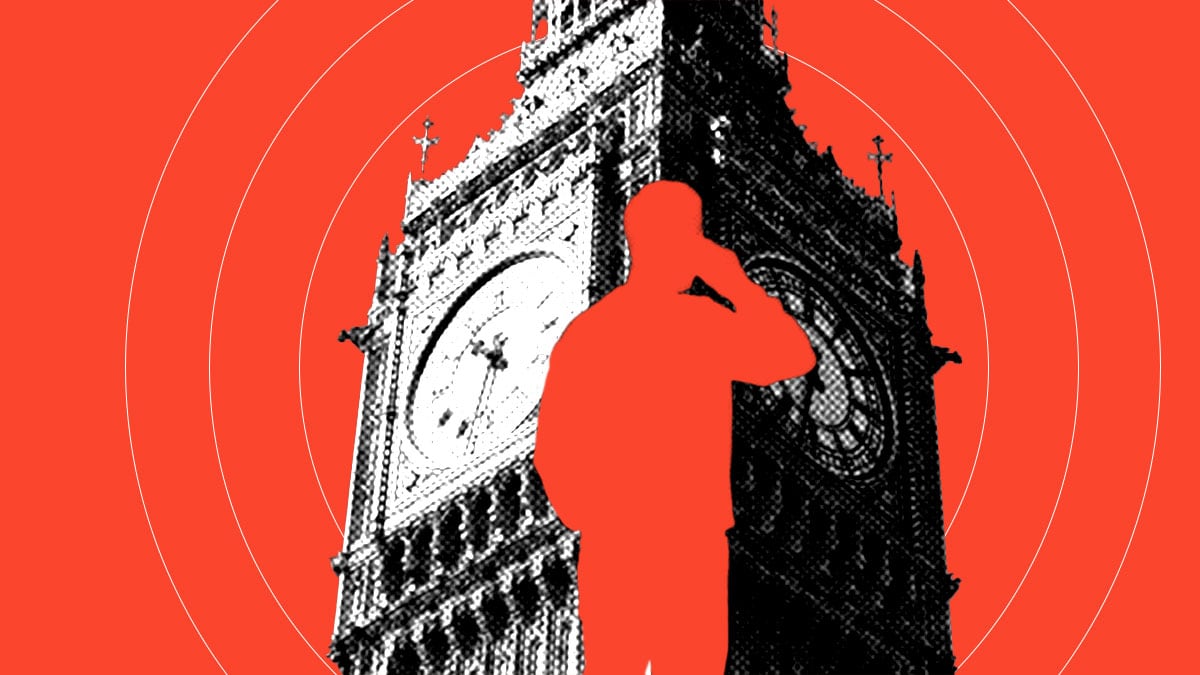The British parliamentary staffer who has been arrested on suspicion of spying for China in the U.K. has released a statement denying the accusations, claiming he was “completely innocent.”
The statement, which the man released through lawyers, comes just after The Sunday Times published a story claiming one of two men arrested earlier this year under the Official Secrets Act was a parliamentary researcher with access to several Conservative members of parliament.
The statement claiming the accused is innocent did not name him, but stated that “to do what has been claimed against me in extravagant news reporting would be against everything I stand for.”
ADVERTISEMENT
“I feel forced to respond to the media accusations that I am a ‘Chinese spy.’ “It is wrong that I should be obliged to make any form of public comment on the misreporting that has taken place,” he said. “However, given what has been reported, it is vital that it is known that I am completely innocent. I have spent my career to date trying to educate others about the challenge and threats presented by the Chinese Communist Party.”
It’s not clear how much access the suspect has had to intelligence information or how much influence he has wielded.
But the accusation has tipped off a firestorm of media coverage—and accompanying consternation from leadership in the U.K. that journalists are focusing coverage on the alleged spy. Several British government officials and members of parliament urged other British leaders to keep things hush-hush.
Commons Speaker Sir Lindsay Hoyle warned members of parliament to not name the accused.
“This is an ongoing sensitive investigation. And members will of course understand that public discussion will be wholly inappropriate,” Hoyle said in a speech, adding that he thinks the media coverage of the apparent espionage affair has been “unhelpful.”
Hoyle suggested that media coverage of the alleged spy could affect future prosecutions.
“We do not discuss the details of security issues on the floor of the House,” Hoyle added.
The head of parliament’s Foreign Affairs Committee, Conservative Alicia Kearns, noted that she wouldn’t comment on the latest updates, given she wants to ensure the probe into the affair is not “jeopardized.”
“I am aware of the Sunday Times report. I will not be commenting,” Kearns said in a Twitter or X post on Saturday. “While I recognise the public interest, we all have a duty to ensure any work of the Authorities is not jeopardised.”
Oliver Dowden, Deputy Prime Minister, told the House of Commons the U.K. is in a state of “constant vigilance” working to protect against foreign interference.
“We maintain constant vigilance in our efforts to understand and root out this interference, and we will always take action to address it—whatever its source,” Dowden said.
Wake-Up Call
The U.K. has been under pressure to respond more strategically to China in recent years, as China has grown more aggressive and coercive on the international stage. Kearns has previously accused the British government of lacking a coherent strategy on Beijing. Just weeks ago, the committee released a report critical of the government’s policy towards China, criticizing the government for keeping its China strategy “buried” and hidden from even senior ministers.
“How can those implementing policy—and making laws—do so without an understanding of the overall strategy,” Kearns said.
The Parliamentary Intelligence and Security Committee has warned that China seeks to interfere in U.K. society and affect British decision-making with respect to China by “targeting officials and bodies at a range of levels to influence U.K. political thinking.”
The Chinese government often leans on individuals in organizations of interest abroad to obtain intelligence information in other countries that could be helpful to Beijing.
Two U.S. Navy sailors were arrested in August, for instance, for allegedly giving sensitive U.S. military information to China, including security information about bases, information on timing of force movements, locations of ships, and a weapons control systems manual, according to court records viewed by The Daily Beast.
The British are no strangers to allegations of Chinese spying on U.K. soil. Last year, Britain’s MI5 said a woman suspected of working for Beijing had been conducting “political interference activities” for the Chinese government by facilitating financial donations to parliamentarians. Britain expelled three Chinese spies posing as journalists in 2021, following intelligence agency MI5 probe into the affair. Concerns have also been raised about Chinese-made cameras enabling Beijing to spy in the U.K. in recent months.
British intelligence warned years ago that the U.K. lacks a proper understanding of Chinese spying. When Ken McCallum—the current head of MI5—was preparing in 2020 to serve as its director general, he claimed he wanted to focus in on China’s targeting in the U.K. more. He said he particularly wanted to sharpen Britain’s focus on Chinese cyber-operations and industrial espionage.
The spying allegations about the British parliamentary researcher have only intensified the pressure to crack down on China’s growing influence in the U.K. Following the arrest of the parliamentary staffer, both Tories and Conservatives called on the government to label China a threat.
But schisms remain in the U.K. Hawkish Tories have been pushing the British government to take a stand and label China a threat to the U.K., while the governing Conservatives are split on the issue, according to the Associated Press.
China’s alleged influence operation targeting parliament in 2022 stirred up calls from members of parliament to respond to China’s interference in U.K. affairs with urgency. One of those lawmakers, Tobias Ellwood, a Conservative lawmaker who is chair of the defense committee, warned this week that the latest incident indicates China has a “longterm” strategy to influence British Parliament.
“In my view we should assume this not an isolated incident—but potentially part of a wider, longterm, Chinese strategy to infiltrate Parliament,” Ellwood said Sunday.
Some have taken the opportunity to call for more extensive vetting of staffers working on sensitive topics.
“Parliament should automatically and routinely check staff working for MPs on sensitive issues including foreign affairs and defence. Enhanced checks would be welcome to almost all MPs and help reduce some risks,” Neil Coyle, a Labour member of the Foreign Affairs Committee, told the BBC. “Given the level of exposure this should be routine and cannot be overlooked any longer given the resources other states now invest targeting Westminster."
But even amid the firestorm of media coverage, the British government has refused to label China as a threat to the U.K.
“We certainly should not be describing China as a foe, but we can describe it as a challenge,” U.K. Business Secretary Kemi Badenoch said.
“I don’t think it’s kind of smart or sophisticated foreign policy to reduce our relationship with China—which after all is a country with one and a half billion people, the second biggest economy, and a member of the UN security council,” Prime Minister Rishi Sunak said.
Sunak has tried to strike a tone of measured diplomacy around the accusations that a parliamentary staffer was helping China spy in the U.K., telling members of parliament that he spoke with Premier Li Qiang at the G20 summit about the accusations.
Sunak said he expressed “that actions which seek to undermine British democracy are completely unacceptable and will never be tolerated.”
The flurry of news reports around the alleged spy come just days after the British Foreign Ministry sought to renew and improve ties with Beijing. Foreign Minister James Cleverly visited Beijing late last month in the hopes of building “mutual respect,” according to Reuters. Cleverly’s visit was the first of a senior British minister in five years.
Nevertheless, criticism is mounting that the British government hasn’t taken a tough enough line against China.
“It's appalling news that we have a potential cell operating in and around Westminster, an espionage cell, and I as a sanctioned individual alongside many of my colleagues are particularly perturbed by this particular news,” Sir Iain Duncan Smith, an ex-leader of the Conservative party, said. “The problem lies in the mess we've got into over what we define China as in respect to us. Are they a threat or are they not?”








